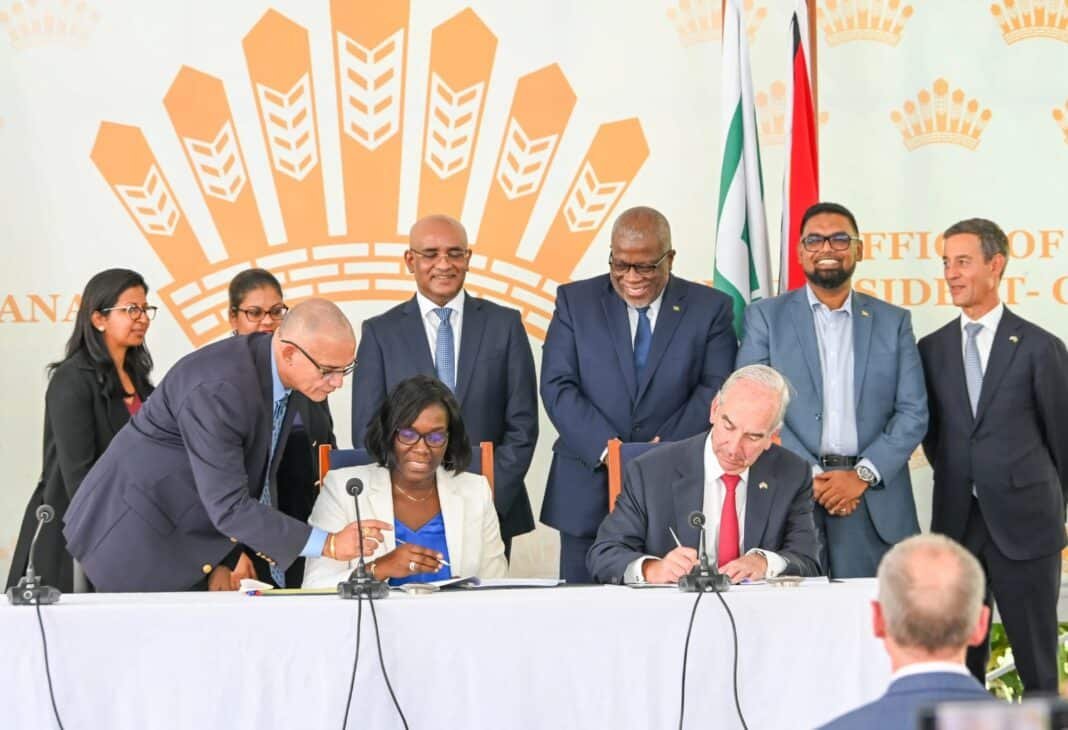US-owned Hess Corporation entered a deal with Guyana to buy $750 million worth of REDD+ carbon credits from the South American nation in the next decade to support efforts in protecting its Amazonian rainforests.
Hess Corporation is a global energy company specializing in the exploration and production of crude oil and natural gas. It’s an industry leader in environmental, social and governance (ESG) performance and disclosure.
Hess is a major partner with ExxonMobil and CNOOC of China in Guyana’s offshore project, the “Stabroek Block”. It’s one of the world’s largest oil and gas discoveries near Suriname’s border.
The multi-year agreement with Guyana that runs from 2022 to 2032 is under the UN Reducing Emissions from Deforestation and Forest Degradation program (REDD+). It involves Hess’ purchase of 37.5 million REDD+ jurisdictional carbon credits (current and future issuances).
This is the second major deal the country has entered in the past decade. In 2009, Norway had agreed to provide $250 million to help ensure Guyana’s 18 million hectares of forest remains intact.
Guyana REDD+ Carbon Credits
The REDD+ carbon credits will be under the ART (Architecture for REDD+ Transactions) registry. ART operates a robust, secure, transparent electronic system to register REDD+ programs. It also records the issuance, transfer, and retirement of serialized verified credits.
The initiative seeks to incentivize governments to reduce emissions from deforestation and forest degradation, restore forests, and protect intact forests.
The REDD+ carbon credits Hess will buy from Guyana will be issued under ART’s REDD+ Environmental Excellence Standard 2.0 (TREES). The program quantifies, monitors, reports, and verifies emission reductions from REDD+ activities at a jurisdictional and national scale.
Remarking on the partnership, President Irfaan Ali said:
“As one of only nine national jurisdictions in the Amazon Basin, we said long ago that national or jurisdiction-scale action on forests, coupled with access to global private finance, could create solutions that benefit the peoples of forest-rich countries while also achieving global climate goals…”
He further noted that the deal represents a massive step forward in “showing the world that developing countries can lead the way to global solutions”.
- The government also says it will pursue efforts to attract more partners in the carbon credits market as Guyana works to reduce harvests of forest resources in a country the size of Britain with less than 1 million population.
Avoiding deforestation is critical to the Paris Agreement’s goal to limit the global temperature rise to well below 2°C. It’s one of the major commitments at the COP26 summit where 130+ countries, including Guyana, pledged to end deforestation by 2030.
Officials in the U.S. recently announced plans to sanction Amazon deforesters.
Low Carbon Development & Net Zero
The deal is also part of Guyana’s Low Carbon Development Strategy (LCDS) 2030. It outlines how the country’s rainforest resources can help combat climate change while promoting a sustainable, low carbon economy.
Guyana’s ~18 million hectares of forests that can store about 20 billion tonnes of CO2e. Its LCDS 2030 serves as the small nation’s roadmap for preserving its forests while growing its economy, too.
At the signing ceremony, Hess Corp. CEO John Hess commented:
“Guyana is one of the most heavily forested countries in the world. We admire the efforts that Guyana has undertaken for years to protect the country’s forest, and provide a strong model for other countries, other businesses and other governments… We are pleased to support the country’s efforts to advance sustainable development and enhance the quality of life for its people.”
Buying REDD+ carbon credits from Guyana is a major part of Hess’ commitment to help address climate change. It’s also important for the company’s net zero emissions target by 2050. The deal adds to the company’s ongoing and successful emissions reduction efforts as laid out in its sustainability reports.
Around 30% of the $750 million investment from Hess will be for developing the Indigenous Amerindian communities. There are nine such tribes in Guyana which accounts for almost 10% of its total population.

